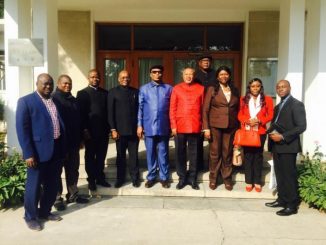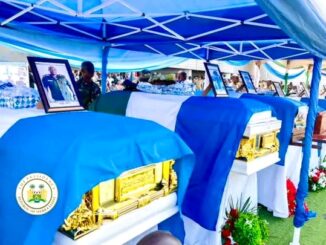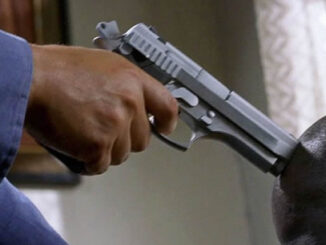Special Court Prosecutor Comments on CDF Sentencing

The following are remarks made by Special Court Chief Prosecutor Stephen Rapp(photo) at a press conference at the Sierra Leone News Agency (SLENA) headquarters in Freetown on Wednesday 10th October:
“We meet today following yesterday’s sentencing of the two convicted persons in the CDF case, Moinina Fofana and Allieu Kondewa. This was the second judgement handed down by the Special Court for Sierra Leone. Once again the judges have upheld the rule of law and recognized the suffering of the people of Sierra Leone and the horrific crimes committed during the country’s civil war.
In yesterday’s CDF sentencing the Court specifically referenced shocking crimes committed by CDF forces. Presiding Justice Benjamin Itoe spoke of women having stakes driven into their genitals and out of their mouths and their entrails use to mark roadways. They also noted that the two Accused had been responsible for the murder of more than 200 civilians, people who were not rebel collaborators, some who were chosen merely because of their ethnicity.
As the judges emphasized, there can be no justification for these crimes. The majority rejected any justification of these acts, stating that accepting the defense of necessity would negate the resolve of the international community. And as the Court further emphasized in its judgement, there is no question as to the responsibility of the convicted persons for these crimes.
The judges found there were several mitigating factors that justified a reduction of sentences of Fofana and Kondewa. Some of these factors are well recognized. They did cite a new factor, their motivations to restore democracy. Of course, many who engage in conflict and who may commit horrible crimes may originally have noble reasons to do so, including the desire to overthrow a purportedly oppressive government and to put into effect a beneficial program for the people. The acceptance of such factors could be used to escape significant punishment for grave crimes committed by all sides, and diminish the protection to innocent civilians. The imposition of short sentences for terrible crimes can also fail to consider and acknowledge the impact of the crimes on the victims.
The pain of awful crimes inflicted on innocent civilians is every bit as terrible when done by defence forces as by rebel groups. The strikes of the machetes and of the bullets did the same damage to human flesh. There can be no justification for the killing of innocent unarmed civilians, and for pillage, collective punishment and the use of children under the age of 15 in armed hostilities.
We are concerned about the imposition of sentences of this length for unquestioned crimes of this terrible nature. We are concerned as well about the potential impact of such a ruling on future war zones where domestic forces fight rebel groups. The innocent in war must always be protected, and must know they are safe from being targeted by any side in the conflict.
We will look at this sentencing judgement closely and deliberate on the possibility of Appeal. Regarding the judgement more generally, we are also looking at possible appeals on the acquittals for crimes against humanity and the acquittal of Fofana for use of child soldiers.
Our Appeals Chamber has been established to review judgments such as this one and to be sure that the final decisions of the Special Court will be a strong precedent applicable to other courts in the region and in the world and will establish an effective deterrent against the commission of the grave crimes like those suffered by the people of Sierra Leone.”



